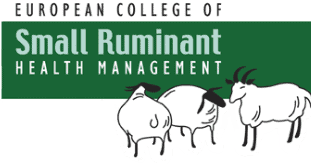How to become a diplomate?
Diplomate definition
Veterinarians elected as Founding Diplomates or Diplomates of the College are registered as such and are authorised to use the designation of “Diplomate of the European College of Small Ruminant Health Management”, abbreviated as Dip.ECSRHM. This is the highest European specialization title in small ruminant health management. It is a superior professional veterinary qualification, with high academic standards.
Veterinarians must meet all the following general criteria for election as Diplomates of the College.
- Have a good moral and ethical standing in the veterinary profession.
- Practice veterinary medicine in a European country or be entitled to obtain a licence for practicing in Europe (unless this obligation is waived by the Board).
- Have successfully passed the certifying procedure of the College.
Diplomate status is revoked to individuals who practice the speciality for less than 60% of professional time devoted to aspects of small ruminant health management and related activities or when the speciality has not been practised for two continuous years or the equivalent of two years within a period of five years. Diplomate status is also revoked to individuals who do not abide by the Constitution and the Bylaws of the College, as well as to those who do not participate actively in the affairs of the College or do not pay promptly the annual membership fees.
Normally, Diplomates are recognised after success in the certifying examination of the College. However, during the initial stages of organisation of the College, Diplomates will be de facto appointed on the basis of their scientific and professional achievements, which will be evaluated by the Founding Diplomates – Invited Specialists of the College.
How to become a diplomate?
1) Veterinarians having completed a standard residency program.
A subsequent period of three (3) years must be in residency training in small ruminant health management under the direct supervision of at least one Diplomate of the College. This period must be taken continuously, on a full-time basis. Every year, the supervisor should prepare a letter confirming satisfactory progress of the resident. Finally, the supervisor should prepare a letter confirming satisfactory completion of the prescribed period.
Only veterinarians who have graduated from EAEVE-approved veterinary educational establishments, can be accepted for a residency training period. The Credentials Committee is empowered to waive this requirement in the case of candidates with high qualifications, relevant and supportive to their subsequent residency training.
2) Veterinarians having completed an alternative training program.
An alternative training program may involve working in a veterinary practice with significant small ruminant work component under the overall supervision of a Diplomate of the College, at the same time undertaking a series of pre-determined specialist training modules provided by external institutions or organisations.
The Education Committee should approve an alternative training program before it starts. An alternative training program should be comparable to a three (3)-year full-time postgraduate training period; the total period should last no more than seven (7) years. The program must take place under the overall supervision of a Diplomate of the College.
- General guidelines on training requirements for standard residency and alternative training programs are available from the Education Committee.
- Training can be undertaken in one of the approved Specialist Training Centres of the College.
- Details regarding the training and the examination procedures of veterinarians wishing to become Diplomates of the College are available in the College Training brochure.


